Ken Koblun is a Canadian musician who played alongside Neil Young in The Jades, the Squires, the Stardusters, and briefly Buffalo Springfield. He replaced Comrie Smith in 3's a Crowd, playing with the band from 1966 to 1967. [1]
Ken Koblun is a Canadian musician who played alongside Neil Young in The Jades, the Squires, the Stardusters, and briefly Buffalo Springfield. He replaced Comrie Smith in 3's a Crowd, playing with the band from 1966 to 1967. [1]
Koblun began his music career as the bassist for the Squires, a teen band formed by Young in the early 60's at Earl Grey Junior High School. After the band broke up, Koblun found work playing bass for various folk musicians. When Stephen Stills and Richie Furay were seeking to start a rock band in Los Angeles, a few months after Koblun had taken a trip to New York City in 1965, they could not find Neil Young, but did succeed in locating Koblun, whom they convinced to come to California to join the new Buffalo Springfield.
However, he stayed for only a few days before deciding to return to Canada where he joined up with 3's a Crowd. In January 1967, a replacement was needed for Springfield's bassist Bruce Palmer, who was fighting possible deportation. Koblun only played with them for about a month before the band decided his personality was undesirable and his bass playing not as good as they anticipated.
During that time he appeared in one of the few film clips of the band, doing lip synchronization to "Sit Down, I Think I Love You" on the television show Where The Action Is . Koblun did not record with the band, but Young's epic "Broken Arrow" is dedicated to Koblun in the sleeve notes of Buffalo Springfield Again.
Koblun appeared on the 3's a Crowd album Christopher's Movie Matinée .
He has worked with various musicians such as, Richie Furay, Stephen Stills, Dewey Martin, Donna Warner, David Wiffen, Trevor Veitch, Brent Titcomb, and Richard Patterson.
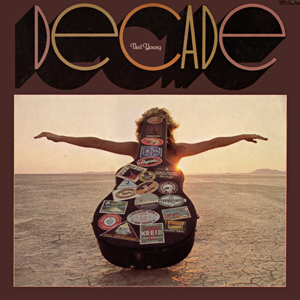
Decade is a compilation album by Canadian–American musician Neil Young, originally released in 1977 as a triple album and later issued on two compact discs. It contains 35 of Young's songs recorded between 1966 and 1976, among them five tracks that had been unreleased up to that point. It peaked at No. 43 on the Billboard Top Pop Albums chart, and was certified platinum by the RIAA in 1986.

Buffalo Springfield was a rock band formed in Los Angeles by Canadian musicians Neil Young, Bruce Palmer and Dewey Martin and American musicians Stephen Stills and Richie Furay. The group, widely known for the song "For What It's Worth", released three albums and several singles from 1966 to 1968. Their music combined elements of folk music and country music with influences from the British Invasion and psychedelic rock. Like contemporary band the Byrds, they were key to the early development of folk rock. The band took their name from a steamroller parked outside their house.

Stephen Arthur Stills is an American musician, singer, and songwriter best known for his work with Buffalo Springfield, Crosby, Stills & Nash, and Manassas. As both a solo act and member of three successful bands, Stills has combined record sales of over 35 million albums. He was ranked number 28 in Rolling Stone's 2003 list of "The 100 Greatest Guitarists of All Time" and number 47 in the 2011 list. Stills became the first person to be inducted twice on the same night into the Rock and Roll Hall of Fame. According to Neil Young, "Stephen is a genius".
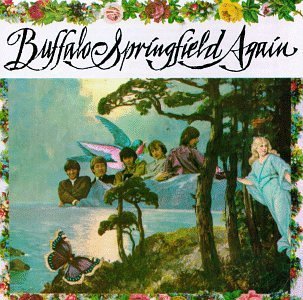
Buffalo Springfield Again is the second album by Buffalo Springfield, released on Atco Records in October 1967. The album features some of the group's best-known songs, including "Mr. Soul", "Bluebird", "Expecting to Fly" and "Rock & Roll Woman", all of which were released as singles. In contrast to the band's hastily made debut album, recording for Again took place over a protracted nine-month span and was fraught with dysfunction, with each member eventually producing his own material largely independent of one another.

Poco was an American country rock band originally formed in 1968 after the demise of Buffalo Springfield. Guitarists Richie Furay and Jim Messina, former members of Buffalo Springfield, were joined by multi-instrumentalist Rusty Young, bassist Randy Meisner and drummer George Grantham. Meisner quit the band while they were recording their first album, Pickin' Up the Pieces, though his bass and backing vocal parts were kept in the final mix. He was replaced by Timothy B. Schmit in 1969, and Messina left in 1970 to be replaced by Paul Cotton. The line-up would change numerous times over the next several decades, with Rusty Young being the only constant member. A reunion of the founding members occurred in the late 1980s-early 1990s, and the band continued in some form through 2021, though they retired from active touring in 2013, with Young citing health concerns as the primary cause of his retirement. Young died from a heart attack in April 2021.

Last Time Around is the third and final studio album by the Canadian-American folk rock band Buffalo Springfield, released in July 1968. The line-up at the time officially consisted of Neil Young, Stephen Stills, Richie Furay, Dewey Martin, Bruce Palmer, and Jim Messina, though the band itself was essentially broken up and the album was put together from previous recordings, some made up to a year earlier. Jim Messina acted as the album producer and mixing engineer, with input from Furay, as the two compiled the record to fulfil the band's last contractual obligation to its label. A number of guest musicians appeared on the album, notably pedal steel guitar player Rusty Young.

Paul Richard Furay is an American musician and Rock & Roll Hall of Fame member. He is best known for forming the bands Buffalo Springfield with Stephen Stills, Neil Young, Bruce Palmer, and Dewey Martin, and Poco with Jim Messina, Timothy B. Schmit, Rusty Young, George Grantham and Randy Meisner. His best known song was "Kind Woman," which he wrote for his wife, Nancy.
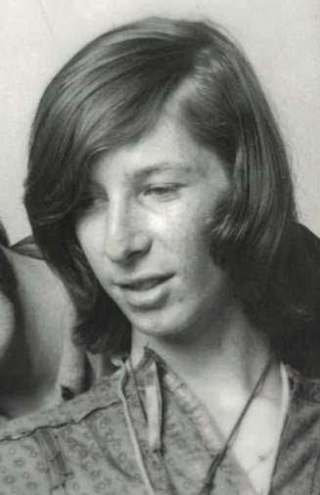
Bruce Palmer was a Canadian musician best known as the bassist in the folk rock band Buffalo Springfield, who were inducted into the Rock and Roll Hall of Fame in 1997.

Buffalo Springfield is the debut album by the folk rock band Buffalo Springfield, released in October 1966 on Atco Records. Band members Stephen Stills and Neil Young wrote all the material on the album.
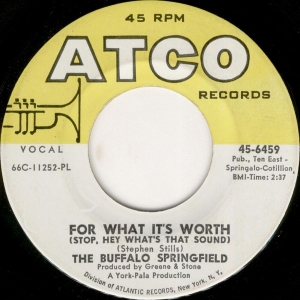
"For What It's Worth " is a song written by Stephen Stills. Performed by Buffalo Springfield, it was recorded on December 5, 1966, released as a single on Atco Records in December 1966 and peaked at No. 7 on the Billboard Hot 100 chart in the spring of 1967.

Retrospective: The Best of Buffalo Springfield is a compilation album released in February 1969 after the band disbanded in mid-1968.

Manassas was an American rock supergroup formed by Stephen Stills in 1971. It was used primarily for Stills' music, the band releasing two studio albums before disbanding in October 1973. They released a 1972 self titled debut and a second album titled Down the Road in 1973.

"Mr. Soul" is a song recorded by the Canadian-American rock band Buffalo Springfield in 1967. It was released June 15, 1967, as the B-side to their fourth single "Bluebird" and later included on the group's second album Buffalo Springfield Again.

Neil Young Archives Vol. 1: 1963–1972 is the first in a planned series of box sets of archival material by Canadian-American musician Neil Young. It was released on June 2, 2009, in three different formats - a set of 10 Blu-ray discs in order to present high-resolution audio as well as accompanying visual documentation, a set of 10 DVDs, and a more basic 8-CD set. Covering Young's early years with The Squires and Buffalo Springfield, it also includes various demos, outtakes and alternate versions of songs from his albums Neil Young, Everybody Knows This Is Nowhere, After the Gold Rush, and Harvest, as well as tracks he recorded with Crazy Horse and Crosby, Stills, Nash & Young during this time. Also included in the set are several live discs, as well as a copy of the long out-of-print film Journey Through the Past, directed by Young in the early 1970s.

Dewey Martin was a Canadian rock drummer, best known for his work with Buffalo Springfield, for which he was inducted into the Rock and Roll Hall of Fame in 1997.
3's a Crowd was a folk rock band from Vancouver who existed from 1964 to 1969, spending most of that time in Toronto and Ottawa. The group had some Canadian chart success, but is particularly notable for the caliber of Canadian musicians who passed through its ranks and would later establish successful careers of their own, including Bruce Cockburn, Colleen Peterson, David Wiffen, Trevor Veitch, and Brent Titcomb. 3's a Crowd is also remembered for its association with Cass Elliott, who co-produced the group's only album.
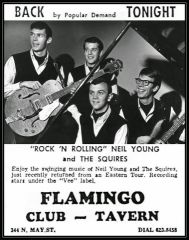
The Squires or Neil Young & The Squires were a Canadian band formed in 1963 in Winnipeg. It was one of the first bands of singer-songwriter Neil Young.

"Bluebird" is a song recorded by the American rock group Buffalo Springfield. It was written and produced by Stephen Stills, with co-production by Ahmet Ertegun. In June 1967, Atco Records released it as a single to follow-up their hit "For What It's Worth" (1966).
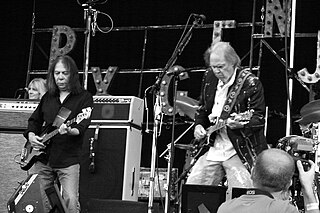
Rick "Rick the Bass Player" Rosas was an American musician, and one of the most sought after studio session musicians in Los Angeles. Though largely known for his long collaboration with Neil Young, throughout his career he also played with Joe Walsh, Crosby, Stills, Nash & Young, Jerry Lee Lewis, Johnny Rivers, Ron Wood, Etta James, and the short-lived reunion of the Buffalo Springfield, among others. He performed as a bass player with The Flash in Jonathan Demme's 2015 film Ricki and The Flash. The band was composed of guitarist Rick Springfield, drummer Joe Vitale, and keyboardist Bernie Worrell, backing up Meryl Streep, as "Ricki", on vocals and guitar.

"Nowadays Clancy Can't Even Sing" is a song by the Canadian-American folk rock band Buffalo Springfield, released as the group's debut single in August 1966. Neil Young wrote the song in Yorkville in 1965 shortly after returning from a series of performances in Toronto, during a period when his bid at a solo career had been met with little positive response. The lyrics reflect metaphorically on Young's frustration toward his stalled career in music, and was inspired by Ross "Clancy" Smith, an aberrant classmate who incited awe in his school. Commentators recognize "Nowadays Clancy Can't Even Sing" as one of Buffalo Springfield's signature songs, as well as a milestone in Young's progression as a songwriter.